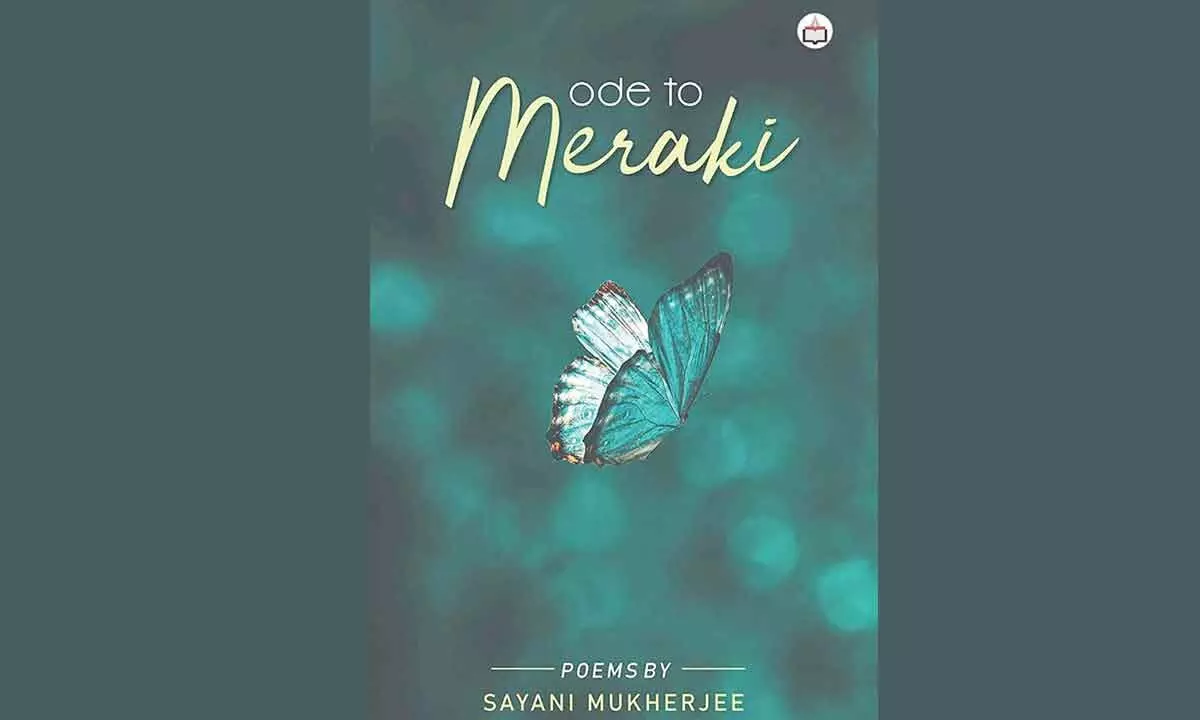A downpour of deep emotions

“Ode to Meraki” by Sayani Mukherjee is a heart-touching collection of Fifty Four poems which reflects on a medley of human emotions.
"Ode to Meraki" by Sayani Mukherjee is a heart-touching collection of Fifty Four poems which reflects on a medley of human emotions. Creating poetic pieces has always been a daunting task, if we compare it with several other literary genres such Novels, Stories, Essays and so on. Poets are divinely gifted human beings who possess sharpened sensitivity and the ability to channelise their pent up pile of feelings in quite a sublime and subtle manner.
Much to our gratification, the poet Sayani Mukherjee is endowed with these heightened sensibilities and retains a flair to regale the apostle of Muse with her elegantly fashioned poetic nuggets. These heart- warming poetic marbles like "April Showers" which are scattered here and there throughout this anthology remind us of two great doyens of Romantic Age, namely William Wordsworth and John Keat. Following the footprints of Wordsworth, this book is richly loaded with poems which transport the readers to salubrious surroundings.
Unlike TS Eliot's April (To which the poet designates the cruelest month in "The Waste Land"), Sayani's April is quite in consonance with Wordsworth who adorns the spring season with several jewels of poetic devices in order to intensify its irresistible charms. The readers begin to experience a deep surge of emotions as they read the following lines "With each spring you glow flushed with Dazzling rain and rushing steps, while the deity of Word eludes you with a grin.
"But it would impertinent to remark that the poem is merely a nature lover's delight. There is a complete shift in its tenor and texture as we read further. "You know why I bid death to metaphors, or trickery that comes with vain trophies……"
The poet chooses to dwell on the inevitable reality of death and she sardonically takes a dig on those who lay waste their lives and vital energies in running insanely after bubble reputation.
Embarking upon her poetic journey with the poem "Circles" in which a profoundly captivating poetic image of Ocean and Seashore throws light on the endless circle of life and death the poet explores the metaphysical elements of transcendentalism and existentialism in the subsequent poems. The anthology concludes with a poem titled as "Maya", which is the culmination of poet's spiritual growth. Here the lotus lake of the supreme and its fragrance waft around in our inward corridors lending us a vision beyond this corporal world of moral human beings.
While reading her poems, readers are fully able to visualise the world, she is referring to. Here the poet seems to be largely influenced by the Imagist Movement in Literature. Somewhat similar to John Keats she prefers to talk in images than in words. Keats who is known for his pictorial quality and sensuousness has inspired a generation of modern day poets and Sayani appears to be one among them. The choice of lexical items and syntax is a painstaking process that every poet has to undergo.
There is a lot of mending and un-mending which goes into the making a superlatively sublime poetic piece. The poet of this anthology has no doubts been quite spontaneous, but she does not refraining from unstitching and rest itching her verses. Her choice of poetic diction elevates her in our estimation when we delightfully find that her words are the words taken from everyday conversations. Her colloquial style of writing which is leavened with complexity- free syntax bedecks her with the status of a people's poet rather than a poets' poet.
The entire poetic carpet proffers an ample glimpse of poet's mindscape, her creative journey and her Ode to Meraki a Greek term that denotes anything to do with soul, creativity and love. Therefore, it would not be hyperbolic to comment that this anthology is a great delectation for the votaries of poetic nuggets.








